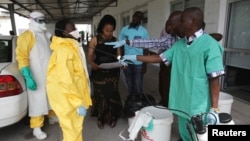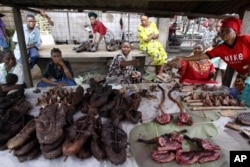State authorities in South Sudan closed part of their border with the Democratic Republic of the Congo last week in an effort to prevent the spread of the deadly Ebola outbreak, declared by the World Health Organization in a remote, northern part of the DRC two weeks ago.
The WHO has confirmed that four people have died from the disease in the DRC. Lino Utu, deputy governor of Tambura state, said the movement of people and goods between the two countries at the border town of Ezo had been restricted until further notice.
"We closed the border temporarily because of Ebola," Utu said. "We have been told it has been found in DR-Congo. If we leave the border open, it can trickle down to Tambura state."
He said the area along the border with the DRC had been teeming with activity, "because it is where the people from the Democratic Republic of the Congo bring in their goods, and also the people from Tambura state bring in their goods. It's a big market."
Uto said doctors have confirmed that Ebola can be found in bushmeat, so state officials have temporarily banned the sale of all bushmeat in the markets.
"We cannot allow bushmeat to be sold any longer because people can easily contract Ebola from meat," Utu said.
The minister of health was informed about Tambura's move to close the border at Ezo on Tuesday.
Utu said international health workers, including those with the WHO, are partnering with local officials to educate the public about how Ebola is spread. "This is awareness that has been going on and on and on," he added.
Utu is appealing to the WHO to send experts to Tambura to screen people for the deadly virus "and advise us in other areas as far as how Ebola is contracted and how we can prevent the spread of Ebola," he said, adding, "I really need them to come to us on the ground in Tambura state."
Authorities in Gbudue state, which also runs along the DRC, have banned the sale of bushmeat in Yambio markets, but have kept border crossing points open. The Gbudue state minister for information, Gibson Bullen Wande, said wildlife officials are creating awareness about the dangers of eating bushmeat. He said state officials and nongovernmental organization health partners have trained and deployed health workers along the border to monitor movement of traders. "We have also left some medical workers along those areas to let them monitor," he said.
Bullen said as far as he is concerned, it is the responsibility of the national government to decide whether to close the border between the two countries.
On Tuesday, the state director of wildlife went on the air to warn people against eating bushmeat.
"We are going to ban the sale of all bushmeat or any trading of the bushmeat [because] those are the things that people get Ebola from," Bullen said.






